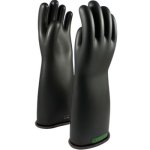newbury
Super Star Member
- Joined
- Jan 8, 2009
- Messages
- 13,545
- Location
- From Vt, in Va, retiring to MS
- Tractor
- Kubota's - B7610, M4700
I've got lots of places with small (<1" diameter) to medium (< 3" diameter) branches getting close to house power lines, generally 200 amp service, and 5 houses/buildings.
I've had the power company come out for one medium branch, took 3 hours for the guy to get there, He just moved the bucket near, donned a heavy pair of gloves and took the branch off the line.
A lot of the branches that are within 10' of the power lines I could trim with a pole saw from the ground. And I would have when I was young and stupid. Now that I am old and stupid I'd like to do it with more safety equipment.
So I was looking into what I call "linemans gloves" and boots, and maybe a rubber apron.
Like I wrote the lines are running household power to a 200 amp or less breaker panel.
What would be the needed "class" of protection?
Electrical safety glove basics | Supply Line Direct

1,000 volts?
500 volts?
Thanks in advance.
I've had the power company come out for one medium branch, took 3 hours for the guy to get there, He just moved the bucket near, donned a heavy pair of gloves and took the branch off the line.
A lot of the branches that are within 10' of the power lines I could trim with a pole saw from the ground. And I would have when I was young and stupid. Now that I am old and stupid I'd like to do it with more safety equipment.
So I was looking into what I call "linemans gloves" and boots, and maybe a rubber apron.
Like I wrote the lines are running household power to a 200 amp or less breaker panel.
What would be the needed "class" of protection?
Electrical safety glove basics | Supply Line Direct

1,000 volts?
500 volts?
Thanks in advance.